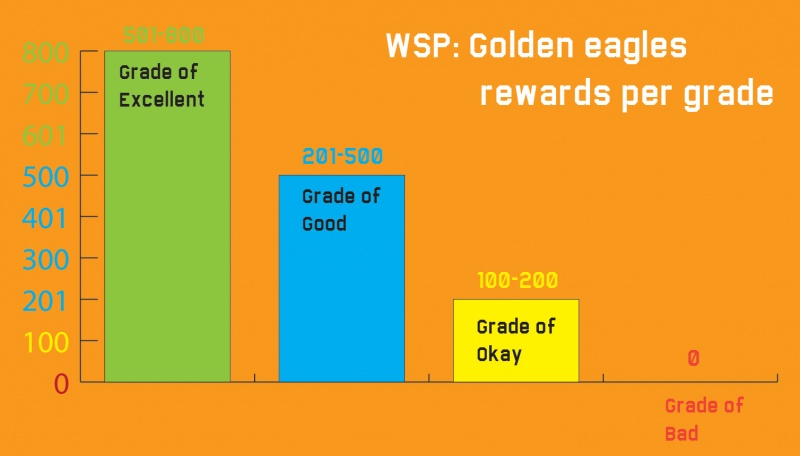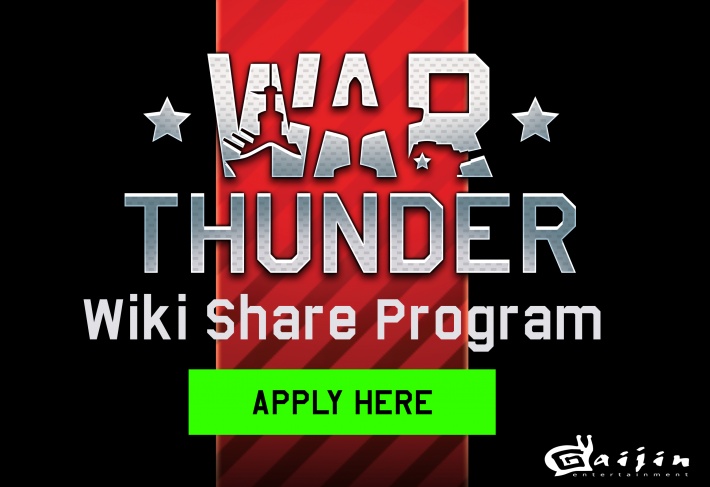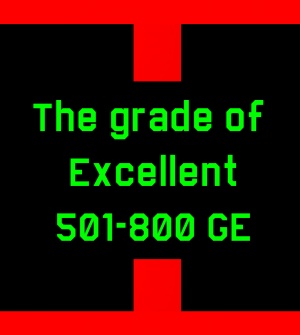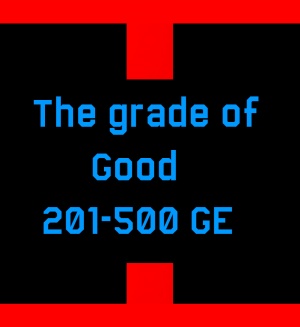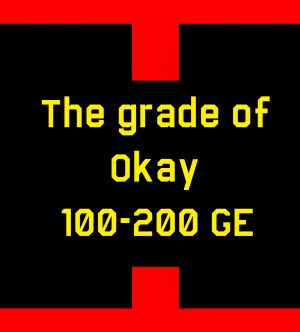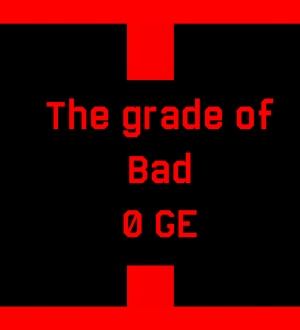Difference between revisions of "WSP"
(→Rewards) |
(→Questions & Answers: UPDATED: How much will you get?) |
||
| Line 387: | Line 387: | ||
'''''Q: How much will you get?''''' | '''''Q: How much will you get?''''' | ||
| − | ''A: | + | ''A: WSP payment will not exceed 60,000 GE with a possible choice of a single vehicle per month, if the condition for a vehicle reward is met. |
| + | *The condition to receive a vehicle on top of the GE, is only provided if you earn over 50,000+ GE in that month. | ||
'''''Q: Will wiki helpers (you) have direct access & communication with the wiki team?''''' | '''''Q: Will wiki helpers (you) have direct access & communication with the wiki team?''''' | ||
Revision as of 22:26, 6 November 2020
Contents
- 1 What is the wiki share program (WSP)
- 2 Important information about the information below
- 3 The grade of excellent
- 4 The grade of good
- 5 The grade of okay
- 6 The grade of bad
The War Thunder: Wiki is launching the "Wiki Share Program" (WSP). What is WSP you may ask?
WSP is an opportunity for you to be part of a team adding content to the War Thunder: Wiki and you will be rewarded with Golden Eagles for your hard work by providing information to vehicle pages. Beta testing of this project as completed and was successful and as such we are now ready for you to participate!
The beta project called "The Wiki Freelance Project" (TWFP), provided a way where we created and helped talented individuals, several of which became part of the Wiki team. During this time, the TWFP filled 141 pages with important and helpful content which resulted in total payouts of 34,685 Golden Eagles.
As part of the WSP team as a "Wiki Helper", you will not be required to sign a non-disclosure agreement's (NDA's) as part of the project. The role of "Wiki Helper" will consist of creating and adding vehicle content to War Thunder wiki pages which need improvement. The War Thunder Wiki Team will be available to help mentor and work with you. Along the way to help you achieve the best which you can do, when it comes to writing content for the wiki.
Based upon suggestions and improvements collected from feedback provided by users of the previous tests, rewards for written articles have been substantially increased along with providing direct access to the wiki team for support and help. As a Wiki Helper, you will be provided with information, examples and support from the Wiki Team to help you write quality pages of information which both new and experienced War Thunder vehicle operators will want to read and reread as they glean the articles for information to boost their gameplay and knowledge.
Our vision
Our vision for the Wiki Share Program, is to provide information which will benefit everyone who plays our game. The main objective here is to pool together the best information for all our vehicles from: Aviation, Ground and Naval Forces.
Rewards
How does this work
Edits which were made until 23:59 of the last day of the month will be recorded as the previous month (Submissions made at 23:59 on 31 August will be counted towards the month of August, where as submissions made at 00:00 on 01 September will be counted towards the month of September). At the start of the next month, i.e 1st that is called a new month, this month will last until 23:59 on the last day of that month.
Once the month has ended, your contribution points will be tabulated and your earned. GE's will be paid into your war thunder account - This transaction process can take up to 7 working days.
| Important: Greenwich mean time will be used Please click here for latest GMT time |
Apply here
Questions & Answers
Q: How can you become part of the Wiki Share Program?
A: There are several ways in which you can become part of the Wiki Share Program which can include participating in and completing competitions, regularly working on adding, editing and updating content to the War Thunder: Wiki, most notably by filling content on the vehicle pages and weapon pages. To participate in this program you will either be invited to join or you can complete an application form to apply to join - Remember, Completing the application for the War Thunder Wiki Share Program does not guarantee you will be automatically accepted into the WSP.
If you would like to be considered for the WSP, but you have never contributed to the War Thunder: Wiki, don’t worry! We have some plans in the works to help show you the way and get you started so that you can submit with confidence ; we will have more information about this soon.
Q: I can earn Golden Eagles for writing articles? How will this work?
A: During the month as you work on and submit final articles, your work will be assessed and given a grade (excellent, good, okay, bad) and will be given a monetary value in Golden Eagles which the War Thunder Wiki Team feels appropriately reflects the final work presented. At the beginning of the next month and within 7 working days of the start of new month, the golden eagles will be paid into your War Thunder game account.
Q: How much will you get?
A: WSP payment will not exceed 60,000 GE with a possible choice of a single vehicle per month, if the condition for a vehicle reward is met.
- The condition to receive a vehicle on top of the GE, is only provided if you earn over 50,000+ GE in that month.
Q: Will wiki helpers (you) have direct access & communication with the wiki team?
A: Yes, wiki helpers (you) will have direct access and communication with the wiki leads and moderators. Why is this being made possible? It will allow you to ask questions, gain clarity and any work through any or challenges, you may be experiencing while working on you articles. Our aim is to help you succeed with your writing, because it: 1) Helps you feel a sense of accomplishment for writing a published article, 2) Earns you Golden Eagles to spend in-game, and 3) Adds to the larger contribution of the entire War Thunder Wiki making it a wealth of knowledge for those learning more about the vehicles in the game along with the history surrounding the vehicles and the role they played in world history!
Q: What benefits can I get and achieve by being in the wiki share program?
A: Participating in the War Thunder Wiki Share Program will help you to develop and advance skill sets on different levels. Whether you are a student, work full-time or are even retired, research and writing skills invoked for this program will help you become more proficient and thus turning in higher quality work, earning you more Golden Eagles. Those who will evaluate your work will be able to identify strengths and can help guide you to articles for you to work on which may play off those strengths. It may be possible through your work to be identified as a potential Wiki editor giving you more responsibility and the ability to mentor others who are participating in the program.
Important information about the information below
| Please note the examples are here to help and guide you. We understand that everyone has a unique way of writing, and we want to keep that; as we believe it creates a personal approach for each writer. However, it is critically important that you understand what is wanted and not wanted for each grade so you can focus on adding content which aims for excellent status and avoid submitting content which qualifies for less. These situations have been explained with examples which will help you and overtime guide you in your effort to achieve the highest possible grade of excellent. |
The grade of excellent
In this grade, called excellent. this is the highest grade which is possible. This is what we are aiming for you to achieve.Let's start with the grade of excellent: In the article below, you will read and learn what is expected to achieve this grade.
- What is and makes an excellent play-style.
- What is expected to achieve the grade of excellent.
- The main difference between Excellent and good grades.
- Recommendations to help you achieve the grade of excellent.
Lets talk about the grade of excellent
What is and makes an excellent play-style
The AH-1Z is featured in an example below of what is considered to be an excellent grade article. It is essential in this level of write-up that the play-style and the information portrayed is written very clear, to the point and flows from subject to subject. Also important is identifying the operational environment of the vehicle can be found in and provide clear oversight of how to play the vehicle to its full potential in battle while drawing the reader in to absorb every detail. In general, the focus of the article needs to detail how the vehicle can be played, how it can be used in specific game modes such as combined battles, what can be expected to do and how to make it do it.
It is important to also include a general guide on how the vehicle plays in conventional battles, a delicate balance must be struck help a new player quickly come up to speed, but also offer important details to help the skills of veteran players too.
What is expected to achieve the grade of excellent
One of the prerequisites to achieve this grade requires you to be clear, direct, and non-bias in the descriptions and details of the writing. It is essential to produce an article which is neutral in its tone along with clearly and objectively laying out what the vehicle can and cannot do.
| When writing in the third person, avoid using first-person pronouns such as I and me or second-person pronouns such as you or your, instead use third-person pronouns like he, she, it, they, him, her, them, his, her, its, their and theirs. |
The ideal mindset when writing the WSP article is to think along the lines of: If you wanted to get your friend to play a specific vehicle, how would recommend them to play it, in what order or steps would you follow to accomplish the specific tasks that vehicle was built for?
It is important to write from experience from playing the vehicles in-game; just reading historical articles will not cut it in writing an excellent level WSP article. It is imperative you find out what the vehicle can and cannot do through playing it, recall what happens, its limitations and how it differentiates between each game mode (arcade, realistic and simulator) such as, handling, reloading, ammunition choices, etc…
The article is also expected to include additional important elements such as, Pros & Cons, weapon loadout options and pertinent performance information which is critical for proper usage of the vehicle.
Recommendations to help you achieve the grade of excellent
- Familiarise yourself with other vehicles with the BR brackets of which it can face.
- Familiarise yourself with the vehicle itself (Learn what it can and cannot do).
- Break down the tasks into groups such as shown in the examples below.
- How can you do this by creating a strategy, a plan.
Examples of an "Excellent Grade: play-style"
In this area examples of excellent play-styles are provided for each class.
| Important: Please note a naval example is coming very soon. |
Aircraft vehicle Example
Click Expand to show
| The hellfire missiles require time to adapt, however once learnt they become one of the most potent missiles in the game. |
Air Protection/support
Best role armament selection: Sidewinder missiles and machine guns
An AH-1Z Viper, offers a unique capabilities compared to any other helicopter on the battlefield! It can be equipped with sidewinder air to air missiles. The sidewinder missiles provide great capacity to shoot down up to two enemy aircraft. They can shoot down other rotary-wing aircraft (helicopters) or fixed-wing aircraft (airplanes). The missiles can also be equipped with the additional payloads, such as hellfire, tow missile, machine gun and rocket pod configurations, providing a versatile offensive and defensive solution.
The AH-1Z can outmanoeuvre and can outperform, many of the rivals in air to air combat. The AH-1Z has a triple rotary m197 cannon with 750 rounds. Combined with a twin 7.62 mm M134 Minigun machine gun, which also has 1500 Rounds per gun. That’s 3000 rounds plus the 750 rounds that’s 3750 Rounds of ammunition! Then the wing mounted AIM-9L sidewinder missiles which are installed on both wings. To attack other helicopters with the sidewinders, come in the from the side or rear – get a lock on and fire one of the sidewinder missiles! Bang the enemy aircraft explodes.
To attack using the cannon and mini-guns, line up with the foe, come in fast and slow down – align your angle of attack with the side of the enemy, this will be the best chance of success since the enemy unit has exposed the largest elements of the airframe to your firepower. Aim for the critical components such as cockpit, engine, fuel tanks and rear rotator elements.
Ground vehicle Example
Click Expand to show
Usage in battlesThe IS-7, similarly to the rest of the IS line, should be played as a breakthrough tank, taking advantage of its extreme durability, and avoiding long-range engagements where its shells simply lose effectiveness. With upwards of 450mm of effective armour in places, there’s no need to shy away from taking on almost any opponent.
The IS-7's extremely thick and well-sloped armour means that the player can comfortably engage multiple threats at once without fear of being penetrated through the sides of his/her turret. With a heightened awareness and a good sense of targeting priority, a well-rounded IS-7 player can swiftly clear out entire enemy squads with ease.
The IS-7 is capable of destroying almost any machine on the battlefield and should have no qualms about combatting anything on the right terms. However, it’s best to be wary of tanks with ATGMs, high-penetration HEAT, large-calibre HESH and anything with APFSDS, as they are able to disable you, often through your frontal plate. Also be wary of any tanks with two plane stabilisers, as the IS-7s main armament is not stabilised in any way and must be stopped before it can fire accurately.Fighting the IS-7
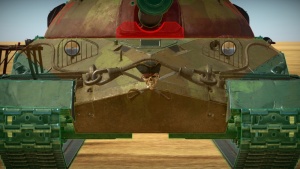
It’s best to avoid taking the IS-7 on if it stands any chance of firing back - it’s very likely that if it gets a shot off, it will be able to destroy your vehicle. Try to disable the gun, or if behind or to the sides, attempt to take out the ammo - the primary store is in the back of the turret, with excess ammunition stored in the upper sides of the hull and beside the driver, as well as a small stash right below the gun breech. If forced to engage the IS-7 from the front, attempt to fire through the turret optic (just above and to the right of the gun when looking at the front), as this is your best opportunity to disable the gunner and the breech. Shooting from an angle significantly reduces the amount of effective armour your shells have to penetrate. The IS-7 can be vulnerable to trap shots or high-calibre HE rounds above the driver’s port, although it does have significantly more armour there than the IS-3. Powerful ATGM's can easily breach hull armour and potentially take out 3 crew members, or explode excessive ammo near to tank's front.
With 7.* vehicles:
IS-7 can easily destroy your entire team with little to no effort, so if you see one, you should immediately start planning your attack or escape route. Firstly, if you can't just attack it with your entire squad, you want it to be alone. Secondly, start predicting where it's going to go, so you can get the advantage of the first attack. Some urban environment with enough cover to sneak up on it and enough space to drive around it is perfect. After that, use your tools of choice:
Smoke and cannon: To make this tactic easier, it's best to ask your scout ally (usually light tank) to "Scout" it constantly if they can. Use smoke shells to completely blind IS-7 and get as close to it as possible. Avoid being hit by numerous machine guns, as it will try to use it to detect you or destroy your scout buddy. Do not drive in a straight line after shooting smoke shells. After getting close, it's advisable to drop even more smokes (the hull mounted ones or the engine exhaust system works perfect, as you don't really have a lot of time), just to make sure that his teammates won't be able to stop you, then try to find out it's rear and set its engine on fire. After that, keep circling around it, setting it on fire and keeping the smoke screen up, or find it's turret's back and destroy the tank with a single well placed shot.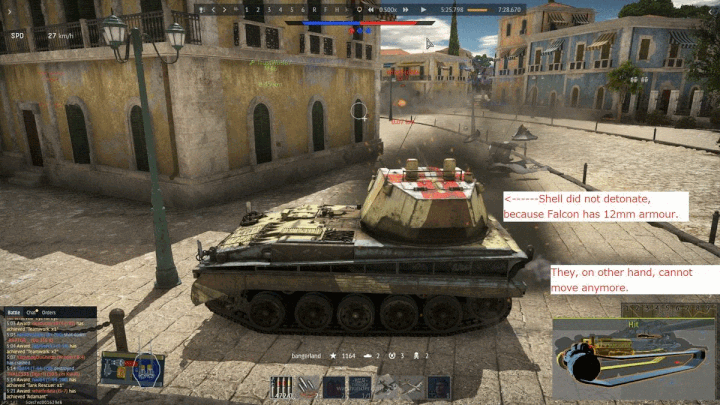
Strength in numbers: Send someone to bait and stall IS-7, while rest are going to flank or simply rush it down. Despite being nearly invulnerable from the front, it may easily explode, when multiple tanks fire at its sides at less than 30° angle. Ideally, you want to send something like T95 or another extremely armoured tank as bait (or even another IS-7 in AB), so foe can't simply destroy it without putting an effort, but if there is none such tanks, sacrifices must be made. Unless...
Combat SPAA: This may sound absurd, but IS-7 can easily be doomed by SPAA. SPAA can easily use some cover to attack it's exposed track with cannons, making moving IS-7 topple over, then destroy second track, to immobilize it. Even if IS-7 fires back at it, APHE is going to over penetrate, if it's armour is less than 15mm. After that, someone can be called in to make a clean side shot (about 170 mm penetration required for sides). In case if SPAA is combat-capable and has APDS shells with 110 mm of penetration, it can try to get behind the turret, while breaking every MG with autocannons, to execute it personally. If IS-7 is aware of your intentions and keeps tracking SPAA with the turret, just set the vehicle on fire by damaging the engine, the foe will have to extinguish the fire eventually or face consequences.
Click Expand to show
Usage in battles
Vosper 2 series is the first boat in the British naval tech tree to be fitted with the 20 mm Oerlikon Mk.II cannon. The Oerlikon Mk.II is a very common gun found all throughout the US and British naval tech trees, and it's a fantastic one at that. With both a very good damage output and a maximum range of about 2.1 km, the Oerlikon Mk.II is a nice change in pace compared to the armament of previous boats. Although they may not be as hard-hitting as the 2 cm/65 C/38 (20 mm), another very common 20 mm gun, the Oerlikon Mk.II has a much larger belt size of 60 rounds, compared to the 40 rounds of the 2 cm/65 C/38. Even with a large capacity belt, it's still good practice to fire off any remaining ammunition after engagements to have the belt be at full capacity for the next engagement. With 1,980 rounds of ammunition, running out of ammunition shouldn't ever really be a concern.
As for her secondaries, Vosper 2 series has a twin 12.7 mm Vickers Mk.V mount. Though lacking the punch of the Oerlikon Mk.II individually, the Vickers Mk.V guns have a better rate of fire, and, together, the two guns have roughly the same damage output as the single 20 mm. Still, the single Oerlikon Mk.II is the better weapon for two reasons: 1) the HE rounds have HE filler, which means that they start fires much more often, even compared to the Vickers Mk.V's incendiary rounds; 2) it can fire directly forwards. This second point is particularly important because it means that it can be fired without exposing the rear and sides of the boat, which greatly increases survivability.
Aim to always keep the bow pointed directly towards the enemy, exposing as little of the sides as possible. This does mean that the rear gun mount won't be able to fire at all, but since it's controlled by the AI gunners, it generally isn't worth sacrificing survivability over. In most cases, it's better to just set the secondaries to target aircraft only and forget about them, relying only on the Oerlikon Mk.II and manually switching to the secondaries only if the Oerlikon Mk.II is knocked out or during reloads.
Both the Oerlikon Mk.II mount and Vickers Mk.V mount have very good firing arcs. The single Oerlikon Mk.II mount can fire in a roughly 157° arc to either side, centered directly forwards, and the twin Vickers Mk.V mount can also fire in a roughly 157° arc to either side, this time centered directly rearwards. Though both guns have a maximum range of approximately 2 km, firing at targets further than 1.75 km or so is impractical in most cases and only serves to waste ammunition and give away your own position.
Ammunition Choices
For the 20 mm Oerlikon Mk.II, the best ammunition choice is the 20 mm HE because it has the highest ratio of HE rounds to AP rounds, meaning that it will be the most effective against both aircraft and surface targets. The 20 mm HE belt should be the main ammunition choice, but a few of the 20 mm AP belt should also be taken into battle for use against armoured targets. The AP belt is also useful against enemies heading directly bow-in. In this situation, HE rounds will only damage the bow compartment and, if that compartment is already destroyed, will deal only minimal damage. AP rounds can pass through the bow compartment and deal damage to the rest of the vessel.
For the 12.7 mm Vickers Mk.V, the 12.7 mm I belt is slightly better against both aircraft and surface targets compared to the 12.7 mm API belt. Though the AP rounds penetrate 5 mm more armour at point-blank than the I rounds, with such a small difference, the AP rounds won't be able to penetrate any armour that the I rounds can't. That said, the damage output between the I and API belt is so little that it's largely down to preference which to use.
Torpedoes
The Mk.VIII torpedoes are a decent torpedo with above-average top speeds and warhead size. Its maximum range is more of less average compared to other torpedoes at this tier.
The Torpedo Mode modification should never be installed. The higher maximum speed is much more valuable against the fast-moving boats of tier I and II, and the 4.57 km maximum range with the Torpedo Mode modification installed is more than enough for the small maps.
Be aware though that, if the torpedo is unused, it can be shot at, and, if it's destroyed, there is a chance the entire boat can be destroyed along with it. For this reason, it's best to either use them early on or to not take them into battle at all.
Depth Charges
Being anti-submarine weapons and with the present lack of submarines in the game, there is practically no reason to use them. While they can be used against surface targets, this is extremely situational. Sailing up right next to a slower target and dropping a depth charge can lead to some success, though again, this is very situational. If attempting this, remember the order in which the depth charges drop and that there is no reason to use any depth charge activation time setting above the minimum 3 seconds, since higher delay times means the depth charge will sink further, and thus away, from the target. Again, it should be reiterated that this is very situational.
There is no practical reason to take them into battle, especially since, if they're not dropped, they essentially become unarmoured ammo racks.
Grade of excellent: Pro's and Con's
What makes an excellent pro and con
Simply put, pro and con statements are simple, to the point and highlight important aspects or flaws of that vehicle.
What is meant by this?
- For a pro it is the competitive advantage of that vehicle.
| What is a competitive advantage: A competitive advantage is something, that the vehicle has or does which the competition does not offer. |
An example of a Pro statement and its explanation based upon the F-100D could be:
- Fast and out-accelerates both MiG-15 and MiG-17's - Competitive advantages are:
- Fast in comparison to other aircraft it will generally face.
- Out accelerate and specifically notes the MiG-15 and MiG-17 as having poor acceleration in comparison.
- From this the general knowledge is that this aircraft is fast and is capable of outpacing competitor aircraft if needed.
- For a con it is the competitive disadvantage of that vehicle.
| What is a competitive disadvantage: A competitive disadvantage is something that the vehicle does not have or do, which unlike it's competition offers. |
An example of a Con statement and its explanation based again upon the F-100D could be:
- While fast, it still accelerates a lot slower than MiG-19PT - Competitive disadvantages are:
- While fast,' reinforces one of the strengths of the F-100D...but...
- accelerates a lot slower than the MiG-19PT makes specific note of a vehicle which has a distinct advantage over the F-100D, noting the F-100D's speed against the MiG-19PT is a con or disadvantage.
| Ideally the pro's and con's should be between 4 and 8 points for each. |
Example of an excellent grade - pro's and con's
Click Expand to show
Pros:
- Excellent guns that have both high muzzle velocity, rate of fire, plenty of ammo (200 RPG), and pack a good punch with high-explosive shells.
- Can carry a wide array of suspended armaments of bombs, rockets and missiles.
- Its air to air missiles(AIM-9B and E) have a longer reach than the missiles on the MiG-19PT
- Fast and out-accelerates both MiG-15 and MiG-17's
Cons:
- Thoroughly unmanoeuvrable at slow speeds, and does absolutely not lend itself to traditional turning dogfights
- Suffers from severe lockup past the Mach 1 mark
- Bleeds a lot of energy when trying to turn around at high speed
- While fast, it still accelerates a lot slower than MiG-19PT
The grade of good
Let's talk about the grade of good
What is and makes and makes a good play-style
A good play-style takes into account the previous grade called okay and further capitalises on it. By further by expanding & documenting the information provided in a good amount of detail: such as the play-style, foes and highlighting the key and critical differences. It is also important to give tips and recommendations on how to play it well and what not to do.
It’s very important to be clear and do it in a way which is simple and brings the reader in.
Recommendations to help you achieve the grade of excellent
- Start to familiarise yourself with other vehicles with the BR brackets of which it can face.
- Start to familiarise yourself with the vehicle itself (Learn what it can and cannot do).
- Explain how to play it.
- Explain What it can and cannot do.
- Bring everything together and try to make it interesting for the reader, try to make the reader go "WOW!"
- Try to do it in way which is simple and to the point but be interesting
Let's talk about the key differences between the two grades of Good and excellent
The main difference between excellent and good is that excellent, contains far more specific information, which is specific about that vehicle. Such how vehicle X can be played in certain game modes, realistic battles and which also contains a general guide of how to play it in arcade. How does specific choices about the vehicle impact it. Let's take the Ground Forces excellent example: in this example, it talks and describes critical information such how to play it. What and how are it's weakness and how to overcome them. It also talks about the other vehicles which are it;s biggest threats and provides specific tactics and game-styles for each point.
Whereas in the grade of good, specific information is mostly missing, not provided but provides an overview of vehicle x only.
Example of an "Good Grade: Play-style"
Click Expand to show
If you must advance, advance facing forward after checking for enemies. As long as your armour faces the enemy, you have relative safety. When defending, go hull-down. Make sure there are places to retreat to if needed, and take advantage of the reverse speed and smoke grenades to run from ATGMs. Use the rangefinder when you can, but if the target is moving, you will probably miss. Try to guess based on experience if it comes to it.
The Abrams main strength its its extreme mobility, even by MBT standards. However, the price comes in protection; the Abrams is quite vulnerable, and struggles to deflect incoming shells with anything except its turret cheeks. Additionally, The M1 has somewhat sub-par penetration even with its best shell. Because of these factors, it is recommended that you do not use this tank as a front line brawler. Instead, use your speed to quickly appear from angles your opponents are not expecting you to come from. This can take the form of flanking in order to get side shots, Rushing at the start of the game to take an advantageous position, or getting to choke points before the enemy does, in order to be ready to knock them out. Essentially, This tank should be played much like the M18 Hellcat at Rank III, though unlike the Hellcat it is not impossible for your armour to help you occasionally.
A useful thing to note when playing the Abrams, and most MBTs in general, is that if your opponent shows any side armour, you can penetrate them almost every time. if someone is coming towards you even at a slight angle, aim for the the front drive wheel on their tracks. Your shell will be able to penetrate into the tank and likely one shot kill them. It is recommended to use APFSDS as the main loadout, as the HEAT-FS ammunition starts coming against tanks with armour types specifically designed to resist it.
In terms of threats:
- Most tanks at its Battle rating, due to the relatively poor armour.
- Type 90 and AMX-40, as their incredibly powerful shots can penetrate you anywhere, at any angle, at almost any distance.
- The T-80B, because of its strong armament and very strong armour. it can be penetrated through its lower front plate, the drivers viewport below the gun, and just to the side or below the gun. If a T80B shows any of its side, you can penetrate it there.
Grade of Good: Pro's and Con's
What makes a good pro and con
What is a good pro or a good con, it is a step just below of excellent grade. Let's explore these pro's and con's which where once stated on the AH-1Z page. Some of these pro's and con's would be equal to a grade of excellent. However, they lack in some of detail which would be required for that grade of excellence. Okay, now you are thinking, great!
Lets explore the pro's segment.
The first, third, fourth and fifth bullet points are great. They are to the point and highlight some of the competitive advantages. However, they lack the full information on why. For example lets take "Excellent ground attack capabilities." If it was listed as "Excellent ground attack capabilities, due to the hellfire missiles which provide pin-point accuracy and great penetration" it would be classed in the grade of excellent. Since it lacks that specific information, it would be classed as a good. In addition, with bullet point two: just inserting "Flares" does not mean anything, if it was explained with it's competitive advantage in mind and reason behind it being listed then it would good.
However, just listing something whereas all vehicles in that tier has it, is not a good pro. Sometimes, it is worth grouping two or three pro's or con's like that together in some way to make it better. To learn what is meant to be a pro and con please click here to learn more
Example of a good grade - pro's and con's
| Important: This applicability also applies to con's as well. |
Click Expand to show
Pros:
- Can carry up to 16 TOW ATGMs (TOW-2 with modification)
- Flares
- One of the fastest helicopters in the game
- Can carry air-to-air missiles to take down aircraft
- Excellent ground attack capabilities.
Cons:
- Weak airframe can be taken down even by roof-mounted MGs from enemy tanks.
- Easy target for dedicated SPAAGs
- Very slow, easy target for SPAAs and aircraft
- Priority target for the enemy team as you are extremely dangerous
- No armor whatsoever.
The grade of okay
Let's talk about the grade of okay
What is and makes and makes an okay play-style
A grade of okay is only achieved by creating an okay play style. What should an okay playstyle consist off? It should cover and focus on the basic’s of the vehicle in question. It only includes one game mode such as realistic or arcade and does not present and fails to admit highly detailed information as found in the grades above.
Recommendations to help you achieve the grade of okay
To achieve the grade of okay, it is essential to study and only focus on the vehicle. Just like previously it is essential to understand why did you write it like this and what could you do improve it, However, to boost it to a grade of good you need to start exploring and adding additional focus on the game-play styles, modes and competitors.
To achieve the grade of okay: make sure it covers these areas:
- Focus only on the vehicle itself.
- How to play it, exploring what it can and cannot do in battle.
- Start Identifying it’s game-play styles and additional information relating to them.
Let’s talk about the critical differences between the two grades of okay and bad
The critical differences between okay and bad are: Okay focuses on the three points as listed above. It centres around a neutral point of view which may sometimes rarely use terms which reflects something, which also hinders the play style. Such as in the example it is listed as “Glass cannon” It is better to use terms such as a “weak cannon”.
The main difference between this and the grade of bad: is that bad does not contain any useful information, poorly written, Phases and comments which are not correct or contain biases, incorrect facts and so on.
Example of an "Okay Grade: Play-style"
Click Expand to show
In realistic battles, the Type 90 continues the traditional Japanese roles of fire support, sniping, and flanking. You can use this vehicle to rush down the center of the map with its speed allowing it to quickly engage and disengage enemies, negating the downsides of the subpar armor by simply not being hit. With a five second reload time for the cannon, and a high-penetration round, it should only take 5-15 seconds to finish of an enemy tank. Through utilizing the terrain by using suspension to hide the chassis when peeking, and angling armor in a way to force enemies to hit your armored turret, the Type 90 can be a very powerful glass cannon in a battle.
Grade of okay: Pro's and Con's
What makes the grade of an okay - pro and con
An okay pro and con talks briefly about the vehicle, such as listing facts about it which contains none to very little use in battle.
Lets take a con from the example below: "Placement of engine allows it to catch on fire when it." This example, is a great example of an okay con. It doesn't clearly state, explain and assumptions are made when reading it.
Another example is this from the example pro: "Tank has ERA all around it" It implies that the vehicle has ERA covering all the tank, whereas ERA only covers the critical areas.
These two examples represent why these are classed as okay. They are on the right direction but lack critical clarity and information. It is assumed and not supported by facts (Evidence). For example if the con was listed as "Placement of engine at the front, allows it to catch on fire when penetrated by an enemy around" This would actually be classed as good. But since it lacks that information and is stated as "Placement of engine allows it to catch on fire when it." it is listed as okay.
Example of an okay grade - pro's and con's
Click Expand to show
Pros:
- Equipped with a powerful and accurate cannon
- Able to fire ammunition of variable types
- Powerful engine which allows it to climb up steep hills
- Engine takes hits when shot at from the front
- Tank has ERA all around it
Cons:
- Has no machine guns, unable to defend itself from aircraft
- Tall tank, allows for enemy to snipe you
- Placement of engine allows it to catch on fire when it.
- Long tank, cannot hide behind huts without poking out
The grade of bad
Let's talk about the grade of bad
What is and makes and makes a bad play-style
In the example below, we shall explore an example, the first paragraph isn’t bad, but okay. However, let's skip this and jump to the second paragraph In this paragraph. Phases and comments where used, which would result in the edit immediately being undone and recorded as a bad edit.
Examples are listed here:
- "However inaccurate and jammy the AN/M3s are, they are still far superior to the 4 "baby flamers" on the F8F-1"
- "Is the WEP awesomeness and the Spas-12 20mms"
Let's explore these two points, the use of these phrases are unwanted and unfactual, they make no sense, provides no clarity, provides no critical information, any actual and factual useful information. An example highlighted is “Spas-12 20mms”.
Please remember this that: the War Thunder Wiki helps users learn how to play their vehicles.
Recommendations to help you avoid the grade of bad
Write down, the information you are recording, and instead of using phrases like “spas-12”, ”Baby Flamers” use terms like authoritative, influential, dominative etc. If you are unsure of a word you want to use but don’t know it, ask an online thesaurus and explore a dictionary. An online thesaurus will be able to provide you with fruitful information, and an online dictionary will be able to help you become the zenith for words.
Another recommendation is to read what you have written once you have done it. Question yourself, on why did you do it like this. Look at other pages which are complete on the war thunder wiki and learn from those. Also study the different grades which are listed on this page which highlight the differences between the various grades.
Example of a "Bad Grade: Play-style"
Click Expand to show
The F8F-1B is truly a worthy aircraft to end the single engine fighter line of the USN branch. Nimble, fast and with great acceleration, it is sight of fear for the foe's eye! Most of its enemies will be jets and they will shiver as the Bearcat faces them with a 2km altitude (and sometimes) and speed advantage! With WEP running ('''W'''ar '''E'''mergency '''P'''ower, includes ADI(Water-Methanol Injection) for the big and hungry 2300hp Pratt & Whitney R-2800 Double Wasp) there is no propeller driven aircraft that can out climb it. When maximized, the climb rate is well over 35 m/s. However, without "radiator" researched, the engine tends to overheat.
The main difference(s) between the 1B and the 1 is the WEP awesomeness and the Spas-12 20mms. However inaccurate and jammy the AN/M3s are, they are still far superior to the 4 "baby flamers" on the F8F-1. The stock belts are perfect; make sure to research new cannons straightaway.
In short, once given engine injection goodness, the 1B is the perfect BnZ fighter. Climb to around 5km and dive on stragglers. Due to improved late-war weaponry, a brush with any cannon shell may damage you mortally. Fire in 2 second bursts. Use the Default belt if you are an intermediate/beginner player, and the Stealth if anywhere higher.
Grade of Bad: Pro's and Con's
What makes a bad pro and con
Lets explore this, these are the types of pro's and con's which are unwanted. They are ineffective or variables.
For example in the pro's a pro was listed a "Has a low BR". Battle ratings are a variable, variables change they are not fixed, they can go up or down. Another one which was listed was British bias and thus is subjective. In order to do these of an okay standard it is important to put aside how you feel and think neutrally about it.
Example of a bad grade - pro's and con's
Click Expand to show
Pros:
- Has a big gun
- British Bias
- Has force shields
- Has a low BR
- BR is 1.0
Cons:
- Slow as a snail
- Hard to play
- Always up-tiered
- Repair costs are high as the moon


